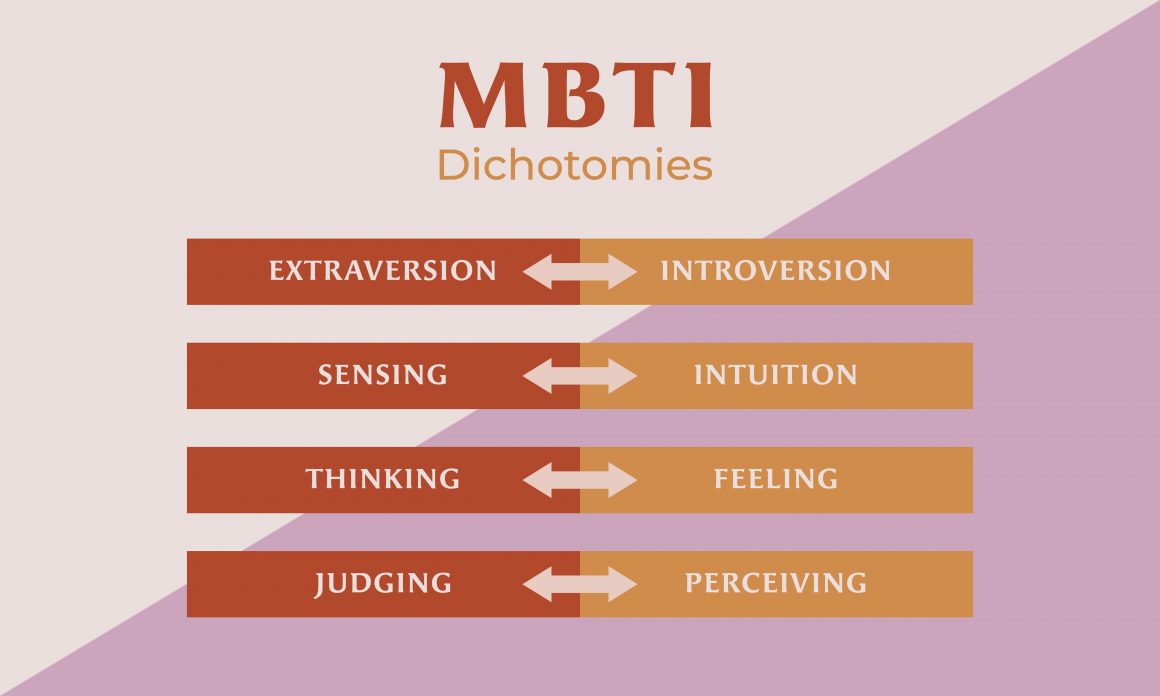If you’ve heard a friend or a colleague describe themselves as an ESTP or an ENFJ, you’ve probably wondered what those cryptic abbreviations mean. The four letters describe the 16 personality types according to the Myers-Briggs Type Indicator (MBTI) – which was designed to identify personality types, preferences, and strengths.
The test was created by Katherine Briggs and her daughter Isabel Myers, who believed that the test could provide important answers when it comes to choosing a suitable career and therefore living a happier, more fulfilling life.
It has become enormously popular in the workplace when it comes to general knowledge, and even in dating apps. It’s one of the most widely used tools in psychology today.
If you’re wondering where you fit, keep reading to learn everything you need to know!
Table of Contents
The Four Scales of the Test

Each of the 16 personality types is represented by one letter out of each of the four scales, which then determines the personality type. Here are the four scales the test looks at.
Extraversion (E) – Introversion (I)
This scale describes how people interact with the world around them, whether they have a preference for outward or inward turning.
- Extroverted people tend to seek social interaction more frequently and feel energized by spending time with others
- Introverted people feel replenished by spending time alone, enjoying deep and meaningful interactions in small chunks.
Sensing (S) – Intuition (N)
This scale looks at how people gather information and what their preference is in certain situations:
- People who prefer sensing are more detail-oriented, pay a lot of attention to reality, and seek hands-on experiences.
- Those who prefer intuition are more focused on impressions, patterns, signs, imagining possibilities and exploring abstract concepts and theories.
Thinking (T) – Feeling (F):
This scale looks at how people make decisions:
- Thinking preference has a greater emphasis on facts, data and logic.
- The feeling preference focuses on people and emotions before reaching a conclusion.
Judging (J) – Perceiving (P):
The final scale looks at how people deal with the outside world:
- Those leaning toward judging prefer more structure, consistency, and firm decisions.
- Those who lean towards perceiving are more flexible, adaptable and open.
These tendencies interact with each other to form an individual’s personality – so keep reading to learn about each of the 16 personality types in more detail.
1. ISTJ: The Inspector

ISTJ (introversion, sensing, thinking, judgment) is a personality type that tends to be practical, quiet, and reserved. They prefer all areas of their lives to be well-organized and orderly, including their work, home, family, and projects.
ISTJs value loyalty and tradition. They’re responsible and realistic. This personality type pays a lot of attention to detail and likes to plan things carefully in advance. When making decisions, ISTJs often rely on their instinct or gut feeling.
When it comes to their relationships with others, they like to spend time with a select group of friends or prefer time alone. This personality type is highly devoted to their friends and family, and once they open up to someone, they build life-long bonds.
Strengths:
- Observant
- Focused on the present
- Realistic
- Organized
Weaknesses:
- Subjective
- Judgmental
- Insensitive
Most Compatible Careers:
- Doctor
- Dentist
- Computer programmer
- Accountant
- Lawyer
2. ISTP: The Crafter

The ISTP (introversion, sensing, thinking, perceiving) personality type is fiercely independent. They enjoy time to think alone and jump head-first into new and hands-on experiences. ISTPs like to take things apart to see how they work and rely heavily on logic in all their decisions.
They are also easily bored if stuck in a repetitive routine. ISTPs are results-oriented, fast-paced, and exited by adventure and risk-taking.
In their personal relationships, ISTPs like to remain independent and detest feeling controlled. They don’t like sharing their emotions with others and usually keep their opinions to themselves.
Strengths:
- Action-oriented
- Realistic
- Self-confident
- Logical
Weaknesses:
- Doesn’t like commitment
- Hard to get to know
- Insensitive
Most Compatible Careers:
- Mechanics
- Science
- Law enforcement
- Software engineering
- Computer programming
3. ISFJ: The Protector

ISFJ (introversion, sensing, feeling, judging) has the nickname of “The Protector”, and for good reason. This personality type is responsible, reserved, and warm-hearted. Their opposite is ENTP.
Despite being quiet and introverted, ISFJs are focused on other people and observe things to a great level of detail. They are good at remembering things about those they care about.
In terms of emotions, ISFJs tend to repress their feelings and struggle to express them. They can bottle up negative thoughts and emotions for a while.
They are creatures of habit who love their routine, need clear instructions, and prefer things to stay the way they are.
In their relationships, they are compassionate and caring – and would often put others’ happiness before theirs. Unfortunately, they tend to be taken for granted by others.
Strengths:
- Reliable
- Eye for detail
- Practical
- Good friend
Weaknesses:
- Neglects own needs
- Change averse
- Avoids confrontation
Most Compatible Careers:
- Office manager
- Nurse
- Counsellor
- Social worker
- Teacher
- Banker
- Accountant.
4. ISFP: The Artist

ISFP (introversion, sensing, feeling, perceiving) is a kind, sensitive, quiet, and friendly personality type. They focus on details and are more present-oriented than future-focused.
ISFPs are more doers rather than dreamers. They love practical applications and learning situations.
ISFPs are tuned in to the world around them and can spot even the slightest change in their surrounding environment. They like to keep their feelings private and tend to avoid sharing their thoughts with others.
Strengths:
- Practical
- Loyal to their beliefs
- Aware of their environment
Weaknesses:
- Dislikes the abstract
- Quiet and reserved
- Needs a lot of personal space
- Avoids conflict and confrontation
Most Compatible Careers:
- Artist
- Chef
- Teacher
- Designer
- Veterinarian
- Composer
- Musician
5. INFJ: The Advocate

INFJ (introversion, intuitive, feeling, judging) is often referred to as the “Idealist” or the “Advocate”, and often feels misunderstood. To others, people with this personality type may often appear as a walking, talking contradiction.
They are both creative and analytical, as well as emotional and logical, which makes them the rarest personality type.
With their strong sense of intuition, INFJs are empathetic, soft-spoken, and supportive of others. Their deeply-held beliefs usually help them get exactly what they want.
Strengths:
- Highly creative and artistic
- Idealistic
- Sensitive to others’ needs
- Values deep relationships
- Future-focused
Weaknesses:
- Overly sensitive
- Stubborn
- High expectations
- Difficult to get to know
Most Compatible Careers:
- Writer
- Artist
- Musician
- Entrepreneur
- Photographer
- Psychologist
6. INFP: The Mediator

INFP (introverted, intuitive, feeling, perceiving) is often referred to as the “idealist” or “mediator” personality type. They are introverted, creative, and driven by strong values and beliefs.
INFPs want to make the world a better place. They seek to gain a deeper understanding – not just of themselves and how they fit into the world, but of others and life’s purpose. They are focused on developing their skills to better serve humanity.
INFPs are quiet, introverted, and reserved. Social interactions can drain their energy, as they prefer to spend more time alone. They can often be perceived as shy.
Strengths:
- Care and genuine interest in others
- Loyal and devoted
- Great at seeing “the big picture”
- Works well alone
Weaknesses:
- Overly idealistic
- Difficult to get to know
- Overlooks detail
- Takes things personally
Most Compatible Careers:
- Artist
- Psychologist
- Writer
- Physical therapist
- Graphic designer
7. INTJ: The Architect

INTJ (introverted, intuitive, thinking, judging), often described as the “Strategist” or the “Architect”, is highly logical, creative, and analytical. INTJs prefer to work alone, focus on the big picture, and appreciate control and order.
INTJs devote a lot of time and effort to improve their personal relationships. They see little value in small talk, which can make them seem a little disinterested or even aloof.
Strengths:
- Good listener
- Takes criticism well
- Self-confident
- Enjoys theoretical concepts
Weaknesses:
- Perfectionist
- Can seem insensitive
- Dislikes talking about emotions
- Overly analytical or judgmental
Most Compatible Careers:
- Scientist
- Judge
- Lawyer
- Engineer
- Dentist
8. INTP: The Thinker

INTPs (introverted, intuitive, thinking, perceiving) are often described as analytical, thoughtful, and quiet. They like spending time alone, focusing on how things work, and being solutions-oriented. With their rich inner world, this personality type can often seem like a dreamer.
They avoid big social circles and prefer to spend their time with a select group of people. They are highly logical when making decisions and are good at thinking outside the box.
In social situations, they are tolerant and easy-going – but they are also so logical that they tend to correct others who don’t present rational arguments.
Strengths:
- Abstract thinking
- Loyal and affectionate
- Logical
- Flexible and independent
Weaknesses:
- Can be insensitive
- Struggles to follow rules
- Self-doubting
- Difficult to get to know
- Hard to persuade
Most Compatible Careers:
- Physicist
- Pharmacist
- Software developer
- Chemist
- Engineer
9. ESTP: The Persuader

ESTPs (extraverted, sensing, thinking, perceiving) are action-oriented, outgoing, and focused on details. ESTPs tend to be dramatic and enjoy spending their time with big groups of people.
They are logical and place a high value on being objective. It’s believed to be one of the most common personality types.
ESTPs make decisions quickly, focus on practical solutions and applications, and exhibit strong social skills in all sorts of situations. They are fast talkers and can often dominate the conversation.
Strengths:
- Funny and energetic
- Persuasive and influential
- Observant
- Adaptable
Weaknesses:
- Can act impulsively
- Competitive
- Insensitive
- Easily bored
- Flair for the dramatic
Most Compatible Careers:
- Marketer
- Sales agent
- Detective
- Paramedic
10. ESTJ: The Director

ESTJ (extraverted, sensing, thinking, judging) personality type people are assertive and goal-oriented. They are committed to standards, tradition, and law – and like to uphold themselves and others to certain principles.
These people would often assume leadership positions, although they can be perceived as stubborn and rigid.
ESTJs are good at remembering things and are less concerned with novelty. They like stability and predictability in their personal relationships.
Strengths:
- Self-confident
- Committed and practical
- Hard-working
- Dependable
- Strong leadership skills
Weaknesses:
- Can appear critical or aggressive
- Insensitive
- Bossy
- Inflexible
Most Compatible Careers:
- Banker
- Business manager
- Judge
- Military
- Politician
- Teacher
11. ESFP: The Performer

ESFPs (extraverted, sensing, feeling, perceiving) are spontaneous, outgoing, and often described as the “class clown”. They love being the center of attention wherever they go.
ESFPs learn through action and like to live in the present. They dislike routine and get easily bored. They are perceptive and understanding of other people’s feelings and needs.
In their relationships, they prefer their partner to plan most things. Easily bored, they need novelty in their romantic relationships.
Strengths:
- Optimistic
- Practical
- Enjoys socializing
- Good leaders
Weaknesses:
- Not good at planning ahead
- Impulsive
- Easily bored
Most Compatible Careers:
- Counsellor
- Musician
- Fashion designer
- Artist
- Actor
- HR specialist
12. ESFJ: The Caregiver

ESFJs (extraverted, sensing, feeling, judging) are often referred to as “The Council” for their outgoing, loyal, tender-hearted, and organized nature. They gain a lot of energy by interacting with others.
They have the special skill to encourage others to do their best and they mainly believe in the good in people.
Strengths:
- Enjoy helping others
- Good at responding to others
- Sensitive to the needs of those around them
- Kind and loyal
Weaknesses:
- Easily hurt by unkindness
- Want to be liked by others
- Controlling
- Dislike change
Most Compatible Careers:
- Nursing
- Childcare
- Counseling
- Teaching
- Social work
13. ENFP: The Champion

ENFPs (extraverted, intuitive, feeling, perceiving) can be described as enthusiastic, creative, charismatic, energetic, and independent. They have excellent people skills and an abundance of energy for social interaction and novelty. They are great leaders and universally liked.
They despise routine and are very future-oriented. They can also be easily distracted and tend to procrastinate.
Strengths:
- Highly creative
- Strong communication and leadership skills
- Empathetic and caring
- Fun to be around
Weaknesses:
- Disorganized
- Easily stressed out
- Overly emotional
- Overthinkers
- Seeks approval from others
Most Compatible Careers:
- Nurse
- Actor
- Journalist
- Politician
- Psychologist
- TV reporter/anchor
14. ENFJ: The Giver

ENFJ (extraverted, intuitive, feeling, judging) is also known as “The Protagonist” or “The Giver”. These people are warm, loyal, sensitive, and outgoing.
Of all the personality types, ENFJ is the strongest “people person”. They forge friendships with all sorts of people and can easily influence others, as they notice how people think and feel around them.
They have a strong desire to help others be their best selves and they derive satisfaction from helping others and being appreciated.
Strengths:
- Outgoing and warm-hearted
- Persuasive
- Encouraging
- Wide social circle
- Organized
- Affectionate
Weaknesses:
- Approval-seeking
- Overprotective
- Indecisive
- Manipulative
Most Compatible Careers:
- Manager
- Teacher
- Psychologist
- HR manager
- Social worker
15. ENTP: The Debater

ENTP (extraverted, intuitive, thinking, perceiving) is often described as “the visionary” or “the innovator”. ENTPs are focused on the present moment, not abstract theories. They like interacting with a wide range of people and love engaging in debates.
They tend to start projects they don’t finish and are laid-back when hanging out. They are immensely curious about the world around them.
Strengths:
- Innovative
- Knowledge hungry
- Great conversationalist
- Creative
Weaknesses:
- Dislikes routine
- Dislikes feeling controlled
- Insensitive
- Argumentative
Most Compatible Careers:
- Journalist
- Scientist
- Lawyer
- Inventor
- Psychiatrist
16. ENTJ: The Commander

The ENTJ (extraverted, intuitive, thinking, judging) personality type is described as confident, assertive, and outspoken – and is one of the rarest personality types. They possess strong verbal skills, and spending time with others makes them energized.
They are future-focused and prefer abstract information over concrete facts. They like to plan, and they enjoy a solid schedule, predictability, and control.
Strengths:
- Strong leadership skills
- Good decision-makers
- Well-organised
Weaknesses:
- Stubborn
- Impatient
- Aggressive
- Intolerant
Most Compatible Careers:
- Entrepreneur
- Professor
- Company CEO
- Scientist
- Lawyer
- Business analyst
The Bottom Line
Based on the results of your personality test, people can explore what they are good at, their likes and dislikes, strengths and weaknesses, possible career choices and compatibility with those around them.
Which one is your personality type?




